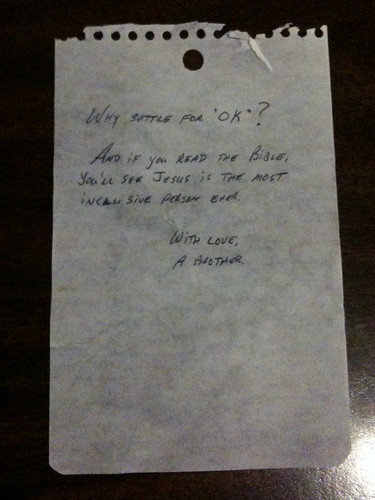I recently bought Bruce Springsteen’s We Shall Overcome: The Seeger Sessions, a collection of American folk and gospel songs. Frankly, I’d never paid much attention to Springsteen; but one day on the train, I was listening to Dancing in the Dark and a coworker asked me if I had any other Springsteen songs on my iPod. I didn’t, so I went online, and found this album. What actually caught my eye was the title of one of the tracks: the famous gospel hymn O Mary Don’t You Weep.
Well if I could I surely would
Stand on the rock where Moses stood
Pharaoh’s army got drownded
O Mary don’t you weep
I’d never heard the song before… but it was familiar. They sung the two lines of the chorus in episode #6 of Dykes To Watch Out For (that’s the Seder episode, collected in More Dykes To Watch Out For). I didn’t know then what kind of song it was, only that the lyrics did seem appropriate for Passover, what with the Red Sea crossing and all. And while I originally thought the “Mary†was Miriam, Aaron’s sister who sang when Pharaoh’s army got drownded (c.f.: Exodus 15:20–21), it’s really Mary Madgalene grieving for Jesus—which I thought was interesting since most of the images are from the Old Testament. More on that later.
God gave Noah the rainbow sign
No more water, but fire next time
Pharaoh’s army got drownded
O Mary don’t you weep
The song is fantastically catchy, with a boisterous jazzy sound that maybe isn’t historically correct, but I won’t complain. I’m not that much of a purist, and I trust The Boss to respect his sources.
I’d heard previous versions of two of the songs on this album: How Can I Keep From Singing? was recorded by Enya on Shepherd Moons. I’m not sure which I prefer; Enya’s style is perfectly suited to this quiet, low-key hymn, but Springsteen’s version has many people singing together, which gives it a very different feel—that of a community united in song. The second familiar song is Jesse James, already covered by The Pogues on Rum, Sodomy & The Lash. Springsteen’s version is far better, without the annoying pistol-shot sound effects and that banjo bit at the very end. I don’t know, it feels like The Pogues were to make it self-consciously “American,†which is just irritating for those of us from this side of the pond. Plus, Bruce’s voice was better, and so was his music.
Speaking of folk heroes, I adored his rendition of John Henry, the steel-driving man. A man who probably didn’t exist but whose story has been raised to the status of myth over the last century and a half. They sure don’t make ’em like that anymore.
I totally misunderstood My Oklahoma Home the first few times I listened to it. It sounded like one man’s love for his homeland (“Well I’m a roam’n Oklahoman/But I’m always close to home/I’ll never get homesick until I dieâ€); with the farm and wife being “blown away†as sort of humorous episodes to explain his freedom of movement. But the song is not about freedom, it’s about loss, about the Dust Bowl: the man’s farm is destroyed by the drought and wind, leaving him poor (“Everything except my mortgage blown awayâ€), alone, homeless and drifting.
So I took off down the road
Yeah when the South wind blowed
I traveled with the wind upon my back
Yet wherever he roams his farm is always near, and he keeps hearing his animals and wife on the wind, so… it’s not all negative? Maybe I’m still not getting the song. As a city boy born and raised, I’ve never felt the pull of the “American Dream,†the need to settle down and own a piece of land.
Fun little factoid: the song mentions a race to stake out land. This probably refers to one of the several Oklahoma land runs, the first of which took place on April 22nd, 1889. I learned about that one in particular from reading Lucky Luke (issue #12, La Ruée sur l’Oklahoma). Ah, memories.
Buffalo Gals is a bouncy little song about prostitutes. The gals in question were in Buffalo, NY, the western end of the Erie Canal. Shippers who’d traveled 300 miles from the Hudson River to Lake Erie could dance with the dollies by the light of the moon—for a price.
Froggie Went A-Courtin’ is a cute little song about a frog marrying a mouse. It reminds me a lot of Pinci-Pincette, a traditional French-Canadian song covered by La Bottine Souriante. In both songs there’s a wedding, lots of animal guests bringing food and entertainment, and hilarious mayhem when those guests are attacked by a nasty predator (a big black snake in Froggie, the house cat in Pinci-Pincette). The liner notes say earlier versions of the song date back to 16th century Scotland. I guess funny animal antics are a common denominator in many cultures.
Eyes on the Prize is another soft and quiet gospel hymn. At first I just listened to the melody without paying much attention to the words. The chorus (“Keep your eyes on the prize/Hold onâ€) seemed just another exhortation to focus on your Heavenly reward at the expense of your life on Earth. As an atheist, of course, that sort of thing rubs me the wrong way. But then I read the lyrics and the liner notes, and my perspective changed.
Only chain that a man can stand
Is that chain of hand on hand
Keep your eyes on the prize
Hold on
I’m gonna board that big Greyhound
Carry the love from town to town
Keep your eyes on the prize
Hold on
The line about the big Greyhound has to refer to the Freedom Rides and so can’t be older than 1961. (That’s perfectly fine; folk songs are not set in stone, but evolve over time, according to the needs of the singer and their audience. In fact, the liner notes say Eyes on the Prize was rewritten in 1956 by Alice Wine, a civil rights activist.) Once I made that connection, I listened to the other gospel songs on the album with fresh ears, over and over… and over and over. I’d known, intellectually, that Christian abolitionist and civil rights activists were inspired by their religion but I hadn’t really understood how. Scriptures and hymns never inspired my activism; I saw them at best as quaint distractions and at worst as tools of oppression when thrown out by bigoted Christians. But here were all these Biblical images of hope and renewal and liberation: the rainbow after the Flood, Jacob’s Ladder, the Israelites leaving Egypt, Jesus returning from the dead, prison doors opening before Paul and Silas (c.f.: Acts 16:16–25). No preaching or dogma, just inspiration for love, brotherhood, and changing things for the better. And for the first time in a long while, I felt Christian hymns spoke to me. Wow. Maybe all I needed was the right singer?
Maybe all I needed was the right message in those hymns. It’s a tricky thing, religion, because what you get out of it is exactly what you bring in. You could read the Flood story and focus on the rainbow sign and renewal of the Earth… or take the story literally and spend your whole life searching for Noah’s Ark. You could read Exodus and be inspired by the Israelites’ march from slavery and bondage into a better Promised Land… or start dreaming of conquest and Manifest Destiny when reading what they did to said Promised Land when they got there. I guess it’s natural that images that inspire activists would also touch me.
You could say O Mary Don’t You Weep, Jacob’s Ladder and Eyes on the Prize are the counterpoint to those old-time missionary tracts I blogged about a while ago. They are part of the same religion, nominally, but otherwise are complete opposites, inspiring action instead of empty prayers, hope instead of fatalism, human dignity instead of servility, a loving God instead of a wrathful God.
The Seeger Sessions is an amazing album, full of songs that made me giggle, made me bounce, made me reflect… sometimes all three at the same time. That’s the thing I love about folk music: it’s a glimpse into different cultures, perhaps different languages or different times. And even for the slower songs, there’s an energy, a vitality that I don’t hear in most modern music. During the recording sessions included on the DVD side (all live, with no rehearsals) you can see the musicians not only having a blast, but also showing off their skills: improvising, jamming, playing with the melodies. It was totally awesome.



